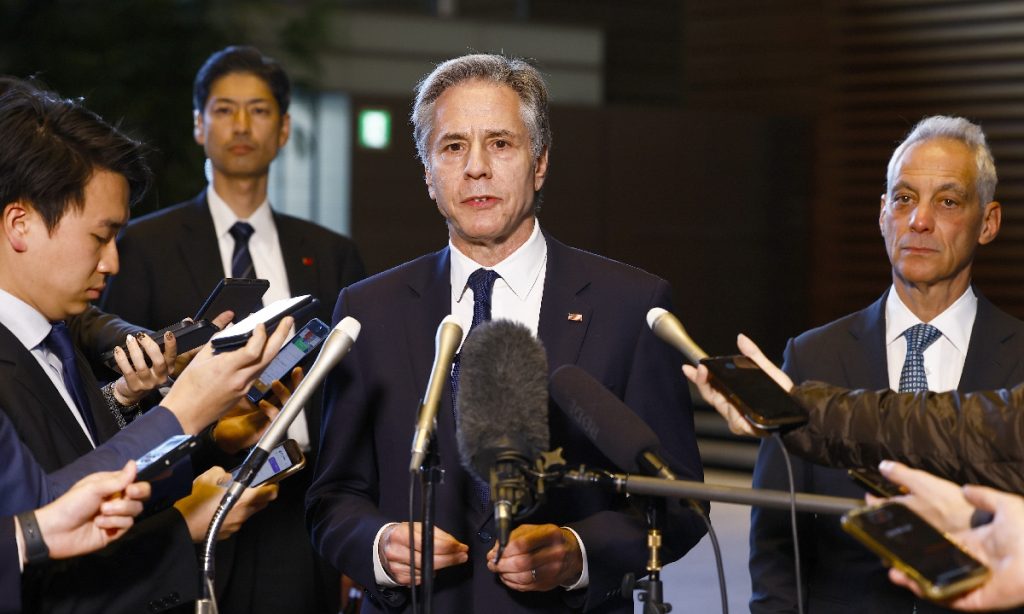Blinken visits Japan under shadow of steel deal

Overshadowed by the recent rift over US President Joe Biden's blocking of Nippon Steel's takeover of US Steel, top US diplomat Antony Blinken kicked off a visit to Japan on Tuesday, while claiming that the alliance between the two countries is stronger than ever.
Some Chinese observers interpreted Blinken's visit to Japan as having limited practical significance, viewing it more as a symbolic gesture seeking to assure Tokyo that their alliance remains robust even after the next administration assumes office. However, this reassurance is surrounded by uncertainties, they said.
"I think one of the things that he [Biden] and we are proudest of is the strength of this relationship, of this partnership, of this allyship. And I believe it's actually stronger than it's ever been," Blinken said, ahead of his talks with Japanese Foreign Minister Iwaya Takeshi, according to a press release by the US department of state on Tuesday.
On January 3, US President Joe Biden blocked the $14.9 billion purchase of US Steel by Japan's Nippon Steel, according to Reuters. The AFP cited business groups as saying that "the decision could have a chilling effect on Japan's standing as the biggest foreign investor in the US."
Nippon Steel Corp and US Steel Corp, according to Japan's Kyodo News, on Monday filed two lawsuits seeking to protect their merger plan from "illegal and improper political and anticompetitive interference" after it was blocked by US President Joe Biden last week.
The announcement came as Japanese Prime Minister Shigeru Ishiba warned of potential repercussions from Biden's decision for the close business ties between the two countries, and urged a detailed explanation of the Biden's reasoning for barring the $14.1 billion deal, which he said creates a national security risk, the report said.
"I will strongly urge the US government to respond toward dispelling [the concerns]," the Japanese Prime Minister said during his first press conference of the year on Monday.
Iwaya and Blinken held a working lunch for about 90 minutes on Tuesday, and "the two ministers concurred on continuing working closely together to further uphold and bolster the Japan-US relationship, which has become stronger than ever," the Japanese Foreign Ministry said in a press release.
Biden's blocking of the merger has cast a shadow over US-Japan relations, Da Zhigang, director of the Institute of Northeast Asian Studies at Heilongjiang Provincial Academy of Social Sciences, told the Global Times. "Although the decision primarily focused on economic issues, such as mutual investment and trade cooperation between the US and Japan, it also reflects some doubts about the US' open policies and free trade system.
These doubts could indeed affect Japanese companies' enthusiasm for investing in the US and might even spread concerns about US investments to other countries."
Commenting on Blinken's emphases on the diplomatic and political legacy of the outgoing Biden administration during the Japan visit, Da said Tuesday that "there is an evident element of political stunt for publicity purposes."
While the US-Japan alliance and US-Japan-South Korea trilateral cooperation in the domain of security have grown stronger in the Biden presidency, the real question is how these cooperation mechanisms will evolve in the next US administration. Blinken's outlook might be somewhat idealistic, as both countries will need to contend with the uncertainties in the next US administration, he said.
"Blinken's visit is mainly aimed at reassuring and consolidating alliances. Both Japan and South Korea have concerns about the US, particularly fearing significant changes in the US' alliance policy, affecting the stability of the strategic cooperation," said Lu Hao, Director of the Strategic Studies Department at the Institute of Japanese Studies, Chinese Academy of Social Sciences.
Tokyo "is concerned that the next administration could put a break on momentum for improving the alliance by slapping high tariffs on Japanese imports or again pressuring Japan to cough up more cash for hosting US troops," the Japan Times reported on Tuesday.
In addition, friction between Japan and the US over steel acquisition case has impacted Japan's strategic perception of the US, affecting strategic trust between the two countries and amplifying Japan's unease, Lu said.